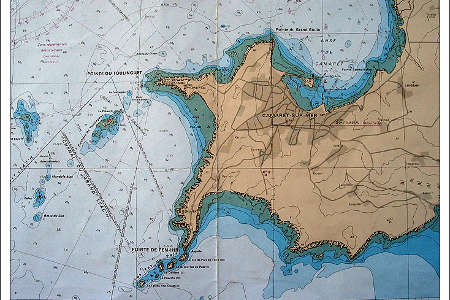

The offshore license is an extension of the coastal license. Therefore, one must have passed the coastal license to be eligible for the offshore license. This license allows its holder to operate a motorized pleasure boat with a power greater than 6 horsepower more than six miles from shelter.
Clarification on the concept of shelter
For the legislator, the term "shelter" refers to a place where the vessel can either dock or anchor safely and depart without assistance.
According to this definition, the concept of shelter can vary depending on the weather conditions. Indeed, a sheltered bay at one moment may no longer be so a few hours later if the wind changes direction. It is therefore up to the sailor to ensure the quality of the shelter they choose based on the evolution of wind and sea conditions.
Although it is not mandatory to operate a sailboat, the offshore license can be useful for sailors who wish to deepen their knowledge of maritime regulations, with a specialization in chart navigation. Holding an offshore license is a real asset for renting a sailboat.
The training for the offshore boat license extension does not include practical training on the water.
The theoretical courses take place in our facilities, in evening classes or in half-day sessions. The training is based on 12 to 20 hours of classes.
The theoretical exam takes place during the week in the administration's premises.
The exam lasts 1 hour and 30 minutes. It consists of problems to solve on a nautical chart and a multiple-choice questionnaire (MCQ).
The theoretical program includes:
The offshore boat license being solely focused on theory, several schools offer this training even outside coastal areas.
Expect around 400 euros depending on the training organizations.
Note: The offshore license is an extension of the coastal license and does not include the costs incurred for the latter.


The offshore license is an extension of the coastal license. Therefore, one must have passed the coastal license to be eligible for the offshore license. This license allows its holder to operate a motorized pleasure boat with a power greater than 6 horsepower more than six miles from shelter.
Clarification on the concept of shelter
For the legislator, the term "shelter" refers to a place where the vessel can either dock or anchor safely and depart without assistance.
According to this definition, the concept of shelter can vary depending on the weather conditions. Indeed, a sheltered bay at one moment may no longer be so a few hours later if the wind changes direction. It is therefore up to the sailor to ensure the quality of the shelter they choose based on the evolution of wind and sea conditions.
Although it is not mandatory to operate a sailboat, the offshore license can be useful for sailors who wish to deepen their knowledge of maritime regulations, with a specialization in chart navigation. Holding an offshore license is a real asset for renting a sailboat.
The training for the offshore boat license extension does not include practical training on the water.
The theoretical courses take place in our facilities, in evening classes or in half-day sessions. The training is based on 12 to 20 hours of classes.
The theoretical exam takes place during the week in the administration's premises.
The exam lasts 1 hour and 30 minutes. It consists of problems to solve on a nautical chart and a multiple-choice questionnaire (MCQ).
The theoretical program includes:
The offshore boat license being solely focused on theory, several schools offer this training even outside coastal areas.
Expect around 400 euros depending on the training organizations.
Note: The offshore license is an extension of the coastal license and does not include the costs incurred for the latter.